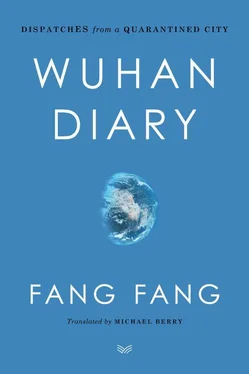I also learned a new term today: “rogue virus.” There was a specialist who said that this virus is quite strange and difficult to get a handle on. During the early stages of infection, there are often no symptoms, which has led to a group of “asymptomatic carriers.” Once you are infected and recover, it seems as if the virus has been completely eradicated, but it may very well just be hidden away deep in your body. Once you feel as though you can finally get back to your daily routine, it suddenly bursts out. Thinking about it like that, it truly is a “rogue.” Actually, the virus isn’t the only one behaving like a rogue. Those politicians who act without regard for the lives of everyday people, not caring whether people live or die; those people who accept donated supplies and then resell them online for a profit; those people who intentionally spit in the elevators or wipe their saliva on their neighbor’s front door; those people who steal packages of emergency medical supplies that hospitals have ordered before they even arrive; and of course those people who go around spreading all kinds of vicious rumors that harm people. Common sense tells us that as long as people exist, disease will always coexist with us. And the same holds true for our social lives—as long as there are people, there will always be those diseased people (what I mean is those ethically corrupt boneheads) living among us.
During times of stability, our lives are ordinary and routine, and the peace and quiet of the monotonous everyday gradually conceals the great kindness and the horrific evil that humans are capable of. Sometimes people spend their entire lives under the cover of the everyday; but when we find ourselves in a time of unrest, during a war or a terrible tragedy, those acts of great kindness and horrific evil all begin to reveal themselves. You begin to see things you never imagined humans were capable of. That experience allows you to witness things that were once unimaginable. You are left shocked, saddened, and angry, and eventually you get used to it. The cycle goes on like this, again and again. Thankfully, as evil raises its ugly head, the face of good rises up even higher. That is what allows us to witness those who are selfless and fearless, those who are willing to sacrifice themselves for others, those we call heroes. They are those angels in white that we see here today.
But let me say more about what is happening in Wuhan now, since that is what people are most interested in. A doctor friend of mine told me that before February 20, Wuhan must open up a new hospital wing with a thousand beds and have enough supplies for 100,000 patients. This means that the early estimate by specialists that there would be 100,000 people infected in Wuhan wasn’t crazy talk, after all. As for those people infected, Wuhan should be able to offer care to all those who need it. Even though there are an incredibly high number of people infected, it still hasn’t gotten worse than what some early projections indicated. Based on his clinical experience, my doctor friend believes:
1. The toxicity of the virus has shown a clear abatement as compared with the early cases;
2. After recovery there do not seem to be any lingering side effects, and there does not seem to be evidence of fibrosis in the lungs of those who have recovered;
3. Newly infected patients are all third- or fourth-generation infections and seem to mostly be mild cases that are easily treated;
4. As long as victims with more serious symptoms are able to get through an initial period of acute respiratory distress, most of them are able to be saved.
In the end, however, the number of deaths we are seeing each day doesn’t seem to be diminishing, but that seems to be a consequence of early cases that were improperly treated. Once those cases got to a critical stage, it was already too late to save them. As I’m writing, my brother just sent me a text: Professor Duan Zhengcheng [22] Duan Zhengcheng (1934–2020) was a professor at Huazhong University of Science and Technology. He was a leading specialist in his field and an academician of the Chinese Academy of Engineering. He also worked as an industrial engineer and inventor, specializing in automation. His contributions were varied and spanned many industries ranging from automotive to laser surgery. He died on February 15, 2020, from the novel coronavirus.
of Huazhong University of Science and Technology just died from novel coronavirus. This is a terrible loss for the university.
Besides this, my doctor friend made a special request for me to say: Currently in Wuhan there are only three hospitals in the entire city that are accepting non-novel coronavirus patients: They are Tongji Hospital, Wuhan Union Hospital, and Hubei People’s Hospital. All other hospitals in the city are being used in the fight against the coronavirus. In order for patients to be able to conveniently pick up their prescription medications, 10 special pharmacies have opened across the city and patients can pick up their prescriptions with their insurance cards and certificate of diagnosis. Of the three hospitals that are open to non-coronavirus patients, two are in Hankou and one is in Wuchang; that means that, without any functioning public transportation, patients must rely on their local communities to help arrange transit.
The Order No. 2 for a complete lockdown of the city just came down. Whenever things happened in the Provincial Literary and Arts Federation housing complex building where I live, the orders used to come down to us from our work unit, but now the families living here have established their own management team. The team contacts people from the local community government to arrange for us to purchase food and supplies. We each have a number and when we are called we go down to the front gate to pick the items up. It is a new way of life for us, and there is a new management system in place to make sure it runs smoothly. We are all very orderly and take our time, patiently waiting for the next opportunity to go downstairs and pick up some supplies.
All this suddenly makes me think of a line from Haizi’s poetry, which I have slightly revised and posted here: “Wuhan, tonight I care not about the boneheads, I care only about you.” [23] Haizi (1964–1989) was an iconic poet who started writing poetry in 1982. He took his life by laying down on a set of railroad tracks on March 26, 1989, at the age of 25. He was one of the most influential poets of the 1980s and his work has continued to be reprinted since his death. In this passage, Fang Fang playfully cites a line from his famous poem, “Tonight in Delingha” (“Jinye zai Delingha”), the final line of which reads, “Sister, tonight I care not about mankind, I care only about you.”
February 16, 2020
There is no peace when living amid a calamity … and “being-toward-death” is just a luxury of the survivors.
I can’t remember how many days it has been since the quarantine began. The weather today is so beautiful that it may as well be spring. All the snow from yesterday has melted away without a trace. I looked outside the window from the second floor and could even see the leaves outside reflecting the sunlight.
Although I’m in a much calmer state of mind as compared to yesterday, those internet attacks from the capital just keep coming. It is hard to understand what it is that could be driving such hatred. These people must be going through life every day just brimming with bottled-up anger. There are so many people they despise, so many things they hate. They have no regard for what their targets might be going through; they just stubbornly push forward with their campaign of hatred. The funny thing is that I’m the target of their hatred, yet we have never met and I have absolutely no connection to them.
Читать дальше



![О Генри - Закупщик из Кактус-Сити [The Buyer from Cactus City]](/books/405348/o-genri-zakupchik-iz-kaktus-thumb.webp)








